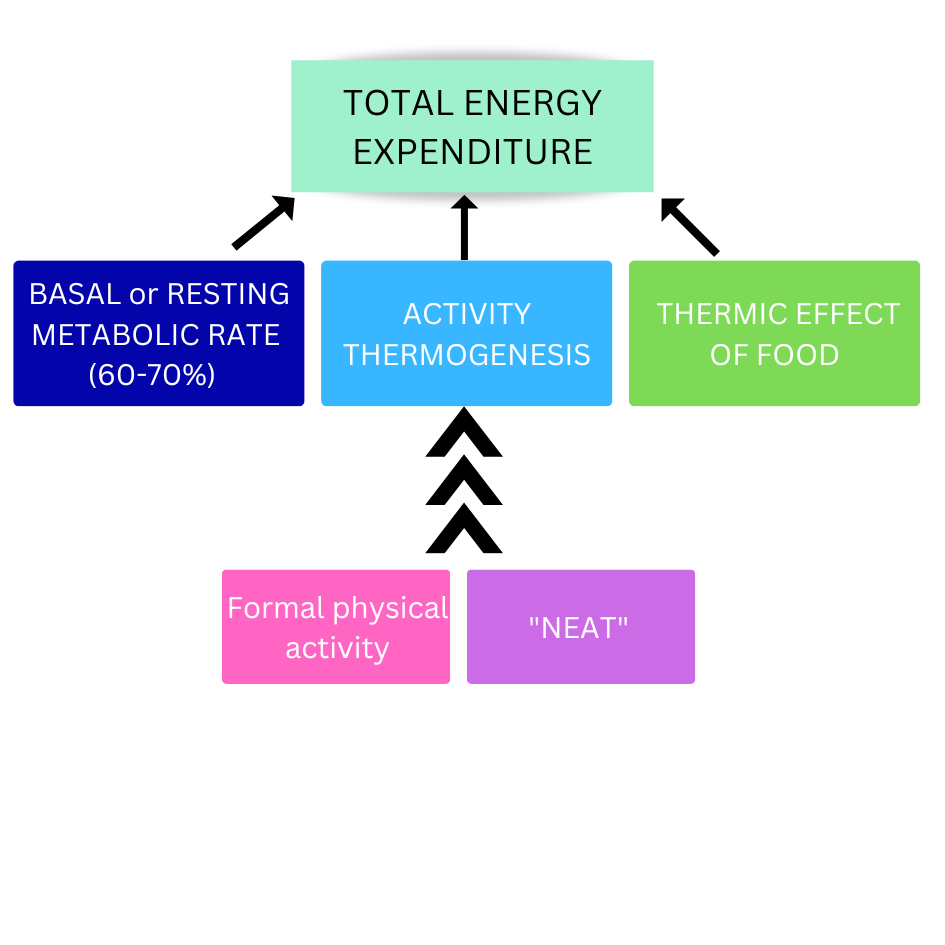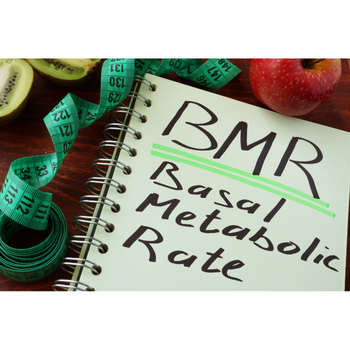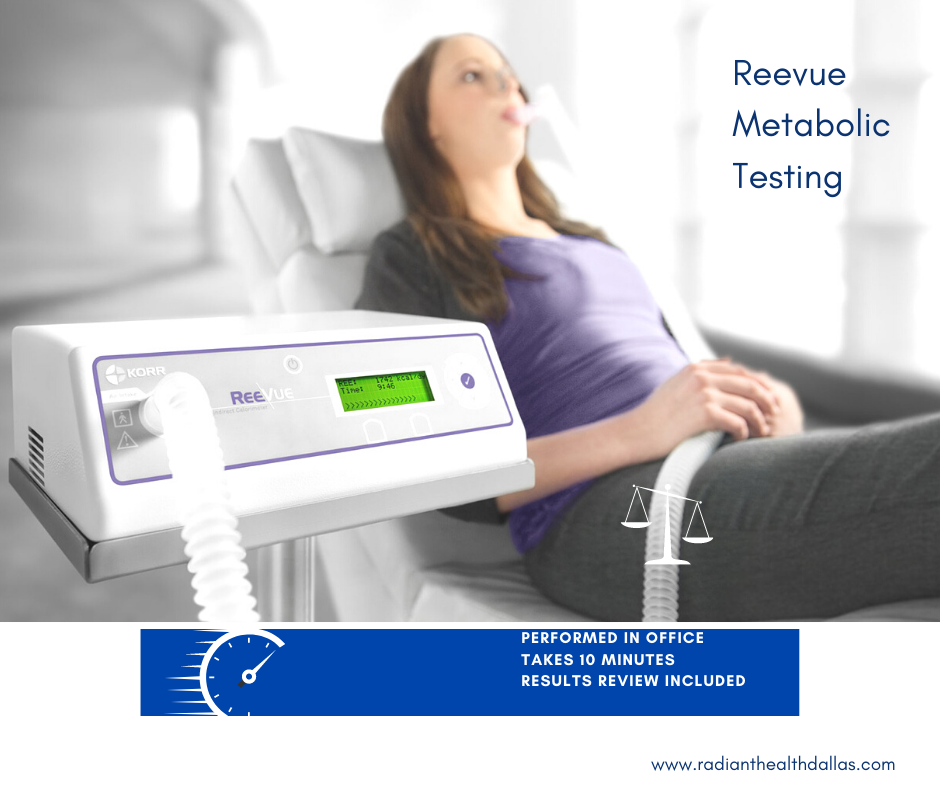
Have you ever wondered what your metabolic rate is?
There are many reasons why a person may want to know how their metabolism is doing. Especially if they are looking to lose excess body fat, struggling with weight loss efforts, looking to improve body composition or improve health conditions like insulin resistance and diabetes, they may be curious about how many calories they are burning.
What is Metabolism?
Metabolism refers to how efficiently our bodies burn food and energy to keep our bodies cellular processes going.
This rate is affected by many factors and is different person to person.
Metabolic rate or the total amount of calories burned (called total energy expenditure) is made up of a few ways we burn calories or energy:

BASAL or RESTING METABOLIC RATE (can be measured for a period of time at rest- learn more below about how we test for this in my practice!) and accounts for 60-70% of calories burned.
ACTIVITY THERMOGENESIS = These are the calories used during formal exercise and in activities outside of formal exercise, called NEAT- Non-exercise activity thermogenesis.
There can be a lot of variability here person to person. A great way to burn extra calories is to focus on non-exercise related activity…. Think- standing, pacing, fidgeting, take the stairs- anything that increases your organic movement!
THERMIC EFFECT OF FOOD = The calories used by the body to digest and process the food we eat.
So, as you can see there are many factors that can affect your rate of calorie burn and determine a fast or slow metabolism.
Genetics play a part in determining our metabolic rate. Although there is not much we can do about this aspect, we CAN however impact other areas that are in our control!

What are some other things that can affect or slow metabolism?
Besides working on increasing your NEAT and formal physical activity to increase metabolism, here are some other areas to focus on that could be impacting your metabolic rate.
Certain medications like antidepressants and antipsychotic medications and medications in the drug class beta-blockers can slow metabolism. It is important to note to never stop any medication without first discussing with your physician. If you are on such medications and if there is concern for weight gain or other metabolic conditions, you could discuss with your doctor regarding possible alternatives.
Some of the medications used to treat obesity actually increase metabolic rate at rest, resulting in more energy/calories used.
Lack of sleep can impact your metabolic rate. Sleeping less than 6-7 hours is associated with weight gain, increased risk of obesity and worsens control of some medical conditions like diabetes and high blood pressure.
Medical conditions like hypothyroidism can slow metabolism. Getting proper treatment is important. Note, having excess thyroid hormone medication is not safe and not a great way to treat obesity and weight loss as it is not only ineffective, but can put your heart, bones and body at risk.
Having low muscle mass (or sarcopenia), not only affects our resting metabolic rate, but also impairs our insulin sensitivity, increasing our risk for conditions like weight gain and type 2 diabetes.
Chronic stress can result in high levels of cortisol that impair insulin function and lead to inflammation and can have effect on metabolism. Dehydration can impair proper functioning of cellular processes so prioritizing getting enough water can help and also help with feelings of hunger, fatigue and low energy.
As you can see, there are many lifestyle factors that ARE in your control when looking to improve your metabolism.
How can Metabolic Testing Help?
Knowing your metabolic rate by doing a metabolic test can aid your efforts for weight loss or maintenance and help you adjust your intake of calories.
You have probably heard weight loss is not just about calories in and calories out; however, for body fat loss to occur, there does have to be a calorie deficit!
However, focusing solely on restricting calories without improving these factors above can make things harder. Not addressing sleep, quality of food intake, stress levels, habits, medical issues and medications does not improve the whole picture.
When not addressed, increased hunger and cravings and reduced fullness can impact your intake and affect your success in achieving your goals.

The Reevue Medical Metabolic Test available in our office can help shed light on your personal metabolic rate so you can adjust your calorie intake for weight loss, maintenance and gain.
In a convenient 10 minute test, the Reevue test measures the oxygen that the body consumes and using this measurement, calculates the Resting Metabolic Rate (RMR). Abnormally low metabolic rates can be identified and precise caloric intake can be determined.
As a result, we can more effectively treat health conditions like obesity, metabolic syndrome, diabetes, high blood pressure, sleep apnea and thyroid disorders.
The Reevue Medical Metabolic Test is FDA-cleared, takes only 10 minutes and gives you a personal and precise measurement of Resting Metabolic Rate, which accounts for 60-70% of your metabolic rate.
A printed results sheet provides you with caloric requirements based on your physical activity and overall goals. The testing could be covered by your health insurance if you have particular medical conditions. We provide a superbill that can be submitted to your insurance.
Learn more about our Reevue Testing HERE.
If you have questions about the testing or are ready to get scheduled, give our office a call at 469-294-3501 today! We are conveniently located in Frisco, close to the Dallas North Tollway.
In health, Richa Mittal, MD
